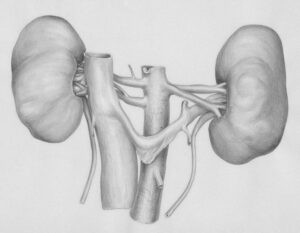The Functions of the kidneys
The kidneys are vital organs that maintain homeostasis and overall health in the body. The two renal organs located in the lower back perform several vital functions that ensure the body’s normal operation. Many individuals are aware that kidneys assist in filtering waste from the blood, although their functions extend well beyond this role. The kidneys perform several functions, including regulating blood pressure, maintaining electrolyte balance, and producing essential hormones, among others. This article discusses the primary functions of the kidneys and their impact on human health.

1. Purifying blood and eliminating waste
The primary function of the kidneys is to eliminate excess chemicals and waste from the bloodstream. The renal arteries provide blood to the kidneys. These arteries bifurcate into smaller blood vessels that supply the nephrons, the essential functional units of the kidneys. The glomerulus is a filtration component of each nephron that segregates waste and excess substances such as urea, creatinine, and toxins from the blood. Subsequent to filtration, the waste is expelled as urine. Beneficial nutrients such as glucose, amino acids, and essential ions are subsequently reabsorbed into the bloodstream.
The filtration process prevents the accumulation of harmful pollutants and waste products in the body that might pose health risks. The kidneys are believed to filter around 180 liters of blood day, producing roughly 1 to 2 liters of urine.
2. Maintaining the equilibrium of fluids and electrolytes
The kidneys help maintain the body’s fluids and electrolytes, such as sodium, potassium, calcium, and phosphate, in appropriate quantities. These balances are crucial for the normal functioning of cells, tissues, and organs. The kidneys regulate the body’s hydration by adjusting the volume of water reabsorbed from the filtrate into the bloodstream. When the body is dehydrated, the kidneys produce concentrated urine to save water. Conversely, when excess fluid is present, the kidneys excrete more water in dilute urine.
The kidneys assist in regulating the appropriate levels of electrolytes inside the body. For instance, they help retain the proper quantity of salt in the body to manage blood pressure, potassium to keep neurons functional, and calcium to keep bones strong. The kidneys regulate this balance by filtering electrolytes and adjusting their reabsorption according to the body’s needs.
3. Regulating blood pressure
The renin-angiotensin-aldosterone system (RAAS) regulates blood pressure, with the kidneys playing a significant role in this process. The kidneys secrete the enzyme renin in response to decreased blood pressure. This initiates a cascade that produces angiotensin II. Angiotensin II induces vasoconstriction of blood vessels, resulting in elevated blood pressure. It also stimulates the kidneys to generate aldosterone, a hormone that instructs them to reabsorb sodium and water, so further increasing blood volume and pressure.
The kidneys help regulate blood pressure by managing blood volume and the constriction of blood arteries. This is crucial for the normal functioning of organs and to prevent conditions such as hypertension.
4. Equilibrium of Acids and Bases
The kidneys play a crucial role in maintaining the stability of the body’s pH level. For optimal functionality, blood must maintain a pH of around 7.4, indicating a slightly alkaline nature. The kidneys regulate pH by excreting hydrogen ions (acid) and reabsorbing bicarbonate ions (a base). The proximal convoluted tubule and distal tubule of the nephron are the primary sites for this process.
In cases of acidosis, the kidneys excrete more hydrogen ions into the urine and reabsorb more bicarbonate to restore normal pH levels. Conversely, if the blood becomes too alkaline (alkalosis), the kidneys may lower the pH by reabsorbing less bicarbonate and excreting more bicarbonate.
5. Hormone Synthesis
The kidneys generate many essential hormones that help maintain the body’s proper functioning:
Erythropoietin (EPO): This hormone instructs the bone marrow to increase the production of red blood cells in response to insufficient oxygen levels in the circulation. Upon detecting decreased oxygen levels, the kidneys synthesize erythropoietin, signaling the body to increase the production of red blood cells for oxygen delivery.
Renin: As previously mentioned, renin is a component of the RAAS system and plays a crucial role in regulating blood pressure by initiating the synthesis of angiotensin II.
Calcitriol (active Vitamin D): The kidneys transform inactive Vitamin D into its active form, calcitriol. This is crucial for intestinal calcium absorption and maintaining bone health.
6. Eliminating drugs and detoxifying the organism
The kidneys facilitate the elimination of poisons by filtering out undesirable substances, including waste products from drug metabolism. The kidneys either directly filter out several medications or metabolize them into excretable forms. The kidneys filter contaminants and facilitate the breakdown of certain drugs and substances for safe elimination from the body.
7. Eliminating metabolic waste
The kidneys filter waste and eliminate by-products of many metabolic activities. Urea is a byproduct of protein catabolism, whereas creatinine results from muscle metabolism. These by-products are waste substances that may accumulate in the bloodstream and cause illness if not excreted. The kidneys prevent the accumulation of harmful substances in the body by expelling them efficiently.
To summarize
The kidneys play a crucial role in maintaining the stability of the body’s internal environment, performing functions beyond mere waste filtration. The kidneys are essential for maintaining bodily health. They regulate fluid balance, electrolytes, and blood pressure, synthesize essential hormones, and maintain the body’s pH equilibrium. Impaired kidney function may lead to several health complications that affect almost every aspect of your life. To ensure long-term health, it is essential to maintain kidney function by consuming enough water, adhering to a balanced diet, and attending regular medical check-ups